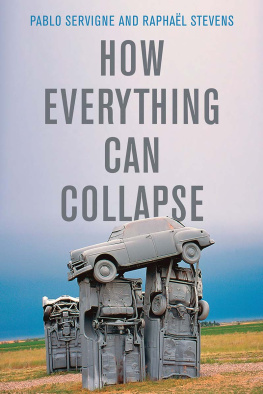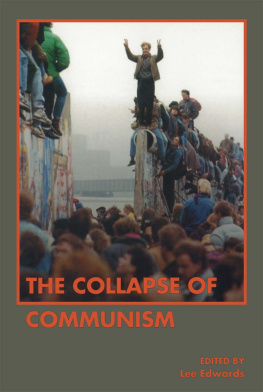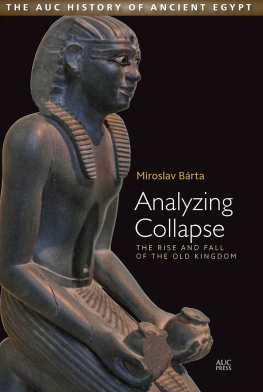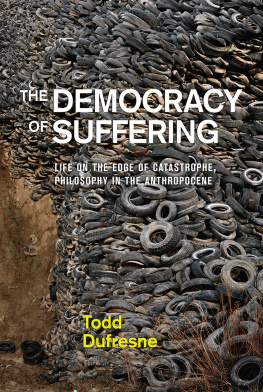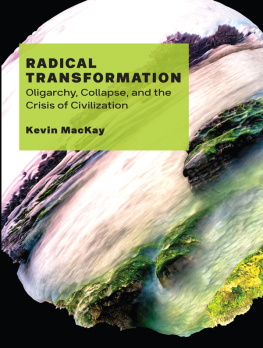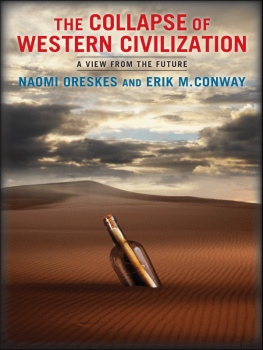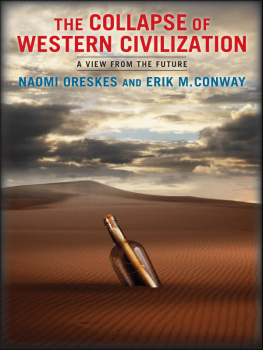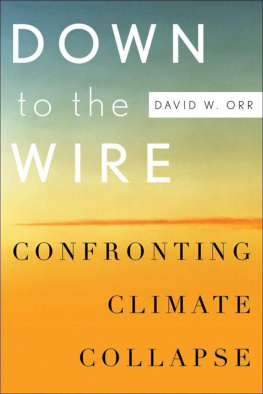
Dedication
To all those who feel fear, sadness and anger.
To all those who act as if we were all in the same boat.
To the rough weather networks inspired by Joanna Macy, that swarm and connect.
HOW EVERYTHING CAN COLLAPSE
A Manual for Our Times
Pablo Servigne and Raphal Stevens
Translated by Andrew Brown
polity
First published in French as Comment tout peut seffondrer: Petit manuel de collapsologie lusage des gnrations prsentes ditions du Seuil, 2015
This English edition Polity Press, 2020
For The Children by Gary Snyder, from Turtle Island, copyright 1974 by Gary Snyder. Reprinted by permission of New Directions Publishing Corp.
Polity Press
65 Bridge Street
Cambridge CB2 1UR, UK
Polity Press
101 Station Landing
Suite 300
Medford, MA 02155, USA
All rights reserved. Except for the quotation of short passages for the purpose of criticism and review, no part of this publication may be reproduced, stored in a retrieval system or transmitted, in any form or by any means, electronic, mechanical, photocopying, recording or otherwise, without the prior permission of the publisher.
ISBN-13: 978-1-5095-4140-9
A catalogue record for this book is available from the British Library.
Library of Congress Cataloging-in-Publication Data
Names: Servigne, Pablo, author. | Stevens, Raphal, author. | Brown, Andrew (Literary translator), translator.
Title: How everything can collapse : a manual for our times / Pablo Servigne and Raphal Stevens ; translated by Andrew Brown.
Other titles: Comment tout peut seffondrer. English.
Description: Cambridge, UK ; Medford, MA : Polity, [2020] | First published in French as Comment tout peut seffondrer: Petit manuel de collapsologie lusage des gnrations prsentes ditions du Seuil, 2015. | Includes bibliographical references. | Summary: A brave book that confronts directly the very real possibility that our civilization will collapse-- Provided by publisher.
Identifiers: LCCN 2019045588 (print) | LCCN 2019045589 (ebook) | ISBN 9781509541386 (hardback) | ISBN 9781509541393 (paperback) | ISBN 9781509541409 (epub)
Subjects: LCSH: Regression (Civilization) | Crises (Philosophy) | Climatic changes--Effect of human beings on. | Global environmental change--Forecasting. | Forecasting.
Classification: LCC CB151 .S4713 2020 (print) | LCC CB151 (ebook) | DDC 909--dc23
LC record available at https://lccn.loc.gov/2019045588
LC ebook record available at https://lccn.loc.gov/2019045589
The publisher has used its best endeavours to ensure that the URLs for external websites referred to in this book are correct and active at the time of going to press. However, the publisher has no responsibility for the websites and can make no guarantee that a site will remain live or that the content is or will remain appropriate.
Every effort has been made to trace all copyright holders, but if any have been overlooked the publisher will be pleased to include any necessary credits in any subsequent reprint or edition.
For further information on Polity, visit our website: politybooks.com
Ecological catastrophes looming worldwide at a time of demographic growth, inequalities due to the local scarcity of water, the end of cheap energy, the increasing scarcity of many minerals, the undermining of biodiversity, soil erosion and pollution, extreme climatic events and so on will produce the greatest inequalities between those able to protect themselves from these problems (at least for a time), and those who will suffer from them. These catastrophes will undermine the geopolitical balance, and trigger conflict. The extent of the social disasters they may cause has led, in the past, to the disappearance of whole societies. This, alas, is an objective historical reality. [] Once the collapse of the species appears as a conceivable possibility, the state of emergency will have no time for our slow and complex processes of deliberation. The West will be panic-stricken, and will transgress its values of freedom and justice.
Michel Rocard (former French Prime Minister), Dominique Bourg (Professor at the Faculty of Geosciences and Environment, University of Lausanne) and Floran Augagneur (Professor of the Philosophy of Ecology at the Institute of Political Studies in Paris), 2011
There is some probability that oil production will peak around 2010, and this will have consequences for security within fifteen to thirty years. [] In the medium term, the global economic system as well as each national market economy could collapse.
Report of the Bundeswehr (German Army), 2010
The following risks are identified with great certainty: [] 3. Systemic risks due to extreme weather phenomena leading to the breakdown of infrastructure networks and essential services such as electricity, the water supply, and health and emergency services. [] 5. Risk of food insecurity and disruption of food systems.
Fifth Report of the Intergovernmental Panel on Climate Change, 2014
Our global civilization today is on an economic path that is environmentally unsustainable, a path that is leading us toward economic decline and eventual collapse.
Lester Brown (founder of Worldwatch Institute, founder and president of the Earth Policy Institute), Plan B 2.0, 2006
Probably the greatest agreement among scholars, though, is that the failing civilizations suffered from growing hubris and overconfidence: the belief that their capabilities after many earlier tests would always rise to the occasion and that growing signs of weakness could be ignored as pessimistic.
Jeremy Grantham (investor, co-founder of Grantham Mayo van Otterloo (GMO), one of the largest fund managers on the planet), 2013
Systems often hold longer than we think, but they end up by collapsing much faster than we imagine.
Ken Rogoff (former Chief Economist of the International Monetary Fund), 2012
Can humanity avoid a starvation-driven collapse? Yes, we can though we currently put the odds at just 10 per cent. As dismal as that sounds, we believe that, for the benefit of future generations, it is worth struggling to make it 11 per cent.
Paul R. Ehrlich and Anne H. Ehrlich (Professors of Biology at Stanford University), 2013
Foreword:
Candles Only Shine Within Darkness
When we read the latest news of disasters, extreme weather, changes to our planet and scientists warnings, it is natural to feel unease, even fear. Some of you may have even suffered direct consequences of climate chaos, such as failing harvests, forest fires or political unrest from prolonged drought. If so, I want to recognize at the outset that my own anxiety about the future is nothing compared to what you have already been through. And that people like me can learn from you. Yet all of us are now being affected by the climate crisis in some way, whether it is from rising prices or the rise of extremism as people feel unsafe and uncertain. Many of us have busy lives and obligations, which means that although we sense this growing danger, it is difficult to turn towards it. Without time to delve into this issue, how can I know what the real situation is? What are the issues to consider or the options we have? Who should we talk to about it all?
These are the difficulties for even starting a conversation about the breakdown or collapse of the society we live in due to climate change. It is why this book is so helpful in starting the conversation. The first step in engaging with this topic is to allow yourself to consider what if the future is as difficult for humanity, everywhere, as some of the scholars are now saying. If you do allow that outlook into your consciousness, then you are embarking on a bizarre ride.
Next page
